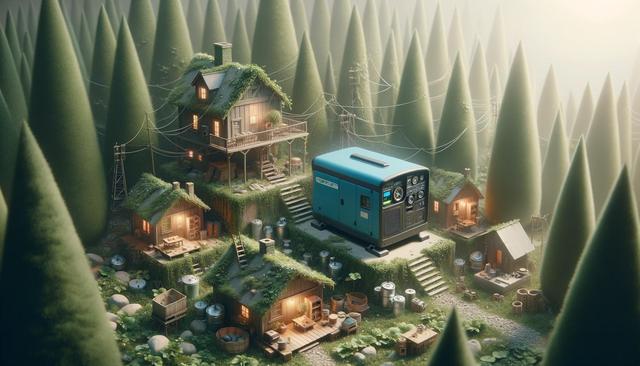Understanding the Role of Home Generators
Home generators serve a critical function in maintaining comfort and safety when the primary power supply is disrupted. Whether due to storms, grid failures, or scheduled maintenance, power outages can disrupt daily life and even pose risks. A Generator For Residential Use offers a dependable way to keep essential systems running, such as heating, refrigeration, communication devices, and medical equipment. These devices automatically detect outages and switch on within seconds, ensuring minimal interruption. More homeowners are exploring options like Backup Solar Powered Generators, which offer the added benefit of sustainability and reduced fuel dependence.
Generators are not just emergency tools; they can also support energy autonomy. In areas with frequent blackouts or unreliable grid service, having a whole-home system can provide long-term peace of mind. This is where Whole House Generators Installed by professionals come into play, offering seamless integration into the home’s electrical system.
Types of Generators for Residential Use
There are various types of generators suitable for home use, each with its unique features and benefits. Choosing the right one depends on a range of factors including power needs, budget, and environmental concerns. Some common types include:
- Portable generators: Compact and budget-friendly, ideal for short-term use.
- Standby generators: Permanently installed and automatically activated during outages.
- Inverter generators: Deliver clean energy suitable for sensitive electronics.
- Solar-powered generators: Utilize stored solar energy, great for eco-conscious homes.
Among these, Backup Solar Powered Generators have gained popularity, particularly in regions with high solar exposure. They offer silent operation and no emissions, making them a cleaner alternative. For homeowners seeking robust and long-term solutions, investing in a Caterpillar Generator can provide reliable and consistent power, especially in larger homes or for extended outages.
Key Considerations Before Installing a Home Generator
Before selecting a generator, it’s crucial to consider several factors to ensure the system meets your home’s specific requirements. Start by calculating your total power needs—this involves listing essential appliances and their wattage. Next, determine your fuel preference. While diesel and gasoline are common, many households are turning to propane or natural gas for cleaner-burning options. Backup Solar Powered Generators are also an increasingly viable choice, especially when paired with battery storage systems.
Other key considerations include:
- Location: The generator should be placed in a well-ventilated area, away from living spaces.
- Noise level: Choose models with lower decibel ratings for quieter operation.
- Installation requirements: Some systems, like Whole House Generators Installed, require professional setup to ensure safety and code compliance.
- Maintenance: Regular servicing is vital to keep your system running efficiently.
Consulting with a certified electrician or generator specialist can help tailor the setup to match your household’s structure and energy demands. Brands that offer models like Caterpillar Commercial Generators can often provide guidance on system sizing and compatibility.
Benefits of Whole House Generator Installation
Opting for Whole House Generators Installed offers several benefits beyond basic backup power. These systems are designed to automatically engage when power from the grid is lost, providing a seamless transition. This is especially beneficial for homes that rely on electrically powered medical devices, security systems, or work-from-home setups requiring constant internet connectivity.
Whole-house systems offer:
- Comprehensive coverage: Keeps the entire home powered, not just selected circuits.
- Automatic operation: No need to manually activate the generator during an outage.
- Increased property value: Adds appeal and functionality to the home.
- Fuel options: Available in diesel, propane, and natural gas configurations.
Some homeowners choose systems powered by well-established manufacturers known for their durability, such as Caterpillar Commercial Generators. These units are engineered for long-term use and can handle substantial electrical loads, making them suitable for larger residential properties or multi-family dwellings.
Maintenance and Long-Term Use
Maintaining your home generator is essential to ensure it functions properly during critical times. Regular checks and professional servicing should be part of your home maintenance routine. For larger units like a Caterpillar Generator, scheduled maintenance is often a requirement to keep warranties valid and ensure optimal performance. This includes checking oil levels, inspecting fuel lines, testing battery voltage, and ensuring proper ventilation.
For solar generator systems, maintenance may involve:
- Cleaning solar panels to maintain efficiency
- Monitoring battery storage levels
- Updating inverter software
Proper upkeep not only extends the life of your generator but also ensures it operates safely and efficiently. Whether you’re using a compact Generator For Residential Use or a more robust system, consistent maintenance protects your investment and keeps your household prepared for the unexpected.
Conclusion: Enhancing Home Resilience with Generators
Investing in a home generator is a proactive step toward greater energy security and peace of mind. Whether you need a simple Generator For Residential Use or are considering Whole House Generators Installed for full coverage, the options available today are more efficient and versatile than ever. With growing interest in sustainable solutions, Backup Solar Powered Generators also offer a compelling alternative to traditional fuel-based systems. Reliable brands, such as those offering Caterpillar Generator models, provide durable systems suitable for a variety of home sizes and needs. By understanding your power requirements and choosing the right system, you can ensure that your home remains functional and safe, even when the grid goes dark.




Leave a Reply